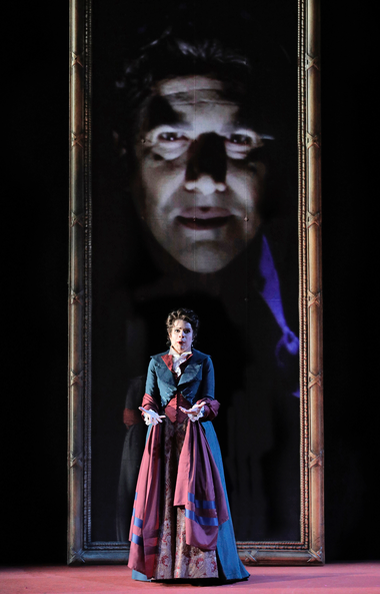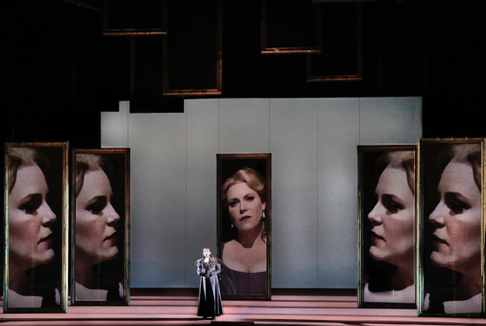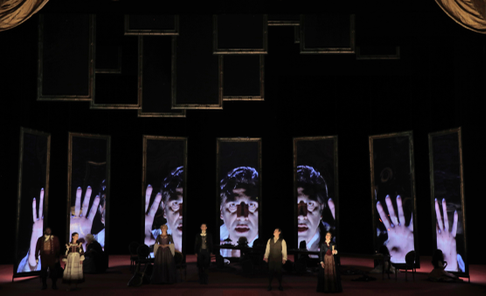
11 Jun 2017
Don Giovanni in San Francisco
San Francisco Opera revved up its 2011 production of Don Giovanni with a new directorial team and a new conductor. And a blue-chip cast.
English Touring Opera are delighted to announce a season of lyric monodramas to tour nationally from October to December. The season features music for solo singer and piano by Argento, Britten, Tippett and Shostakovich with a bold and inventive approach to making opera during social distancing.
This tenth of ten Live from London concerts was in fact a recorded live performance from California. It was no less enjoyable for that, and it was also uplifting to learn that this wasn’t in fact the ‘last’ LfL event that we will be able to enjoy, courtesy of VOCES8 and their fellow vocal ensembles (more below …).
Ever since Wigmore Hall announced their superb series of autumn concerts, all streamed live and available free of charge, I’d been looking forward to this song recital by Ian Bostridge and Imogen Cooper.
The Sixteen continues its exploration of Henry Purcell’s Welcome Songs for Charles II. As with Robert King’s pioneering Purcell series begun over thirty years ago for Hyperion, Harry Christophers is recording two Welcome Songs per disc.
Although Stile Antico’s programme article for their Live from London recital introduced their selection from the many treasures of the English Renaissance in the context of the theological debates and upheavals of the Tudor and Elizabethan years, their performance was more evocative of private chamber music than of public liturgy.
In February this year, Albanian soprano Ermonela Jaho made a highly lauded debut recital at Wigmore Hall - a concert which both celebrated Opera Rara’s 50th anniversary and honoured the career of the Italian soprano Rosina Storchio (1872-1945), the star of verismo who created the title roles in Leoncavallo’s La bohème and Zazà, Mascagni’s Lodoletta and Puccini’s Madama Butterfly.
Evidently, face masks don’t stifle appreciative “Bravo!”s. And, reducing audience numbers doesn’t lower the volume of such acclamations. For, the audience at Wigmore Hall gave soprano Elizabeth Llewellyn and pianist Simon Lepper a greatly deserved warm reception and hearty response following this lunchtime recital of late-Romantic song.
Collapsology. Or, perhaps we should use the French word ‘Collapsologie’ because this is a transdisciplinary idea pretty much advocated by a series of French theorists - and apparently, mostly French theorists. It in essence focuses on the imminent collapse of modern society and all its layers - a series of escalating crises on a global scale: environmental, economic, geopolitical, governmental; the list is extensive.
For this week’s Live from London vocal recital we moved from the home of VOCES8, St Anne and St Agnes in the City of London, to Kings Place, where The Sixteen - who have been associate artists at the venue for some time - presented a programme of music and words bound together by the theme of ‘reflection’.
'Such is your divine Disposation that both you excellently understand, and royally entertaine the Exercise of Musicke.’
Amongst an avalanche of new Mahler recordings appearing at the moment (Das Lied von der Erde seems to be the most favoured, with three) this 1991 Mahler Second from the 2nd Kassel MahlerFest is one of the more interesting releases.
‘And there was war in heaven: Michael and his angels fought against the dragon; and the dragon fought and his angels, And prevailed not; neither was their place found any more in heaven … that old serpent … Satan, which deceiveth the whole world: he was cast out into the earth, and his angels were cast out with him.’
If there is one myth, it seems believed by some people today, that probably needs shattering it is that post-war recordings or performances of Wagner operas were always of exceptional quality. This 1949 Hamburg Tristan und Isolde is one of those recordings - though quite who is to blame for its many problems takes quite some unearthing.
There was never any doubt that the fifth of the twelve Met Stars Live in Concert broadcasts was going to be a palpably intense and vivid event, as well as a musically stunning and theatrically enervating experience.
‘Love’ was the theme for this Live from London performance by Apollo5. Given the complexity and diversity of that human emotion, and Apollo5’s reputation for versatility and diverse repertoire, ranging from Renaissance choral music to jazz, from contemporary classical works to popular song, it was no surprise that their programme spanned 500 years and several musical styles.
The Academy of St Martin in the Fields have titled their autumn series of eight concerts - which are taking place at 5pm and 7.30pm on two Saturdays each month at their home venue in Trafalgar Square, and being filmed for streaming the following Thursday - ‘re:connect’.
The London Symphony Orchestra opened their Autumn 2020 season with a homage to Oliver Knussen, who died at the age of 66 in July 2018. The programme traced a national musical lineage through the twentieth century, from Britten to Knussen, on to Mark-Anthony Turnage, and entwining the LSO and Rattle too.
With the Live from London digital vocal festival entering the second half of the series, the festival’s host, VOCES8, returned to their home at St Annes and St Agnes in the City of London to present a sequence of ‘Choral Dances’ - vocal music inspired by dance, embracing diverse genres from the Renaissance madrigal to swing jazz.
Just a few unison string wriggles from the opening of Mozart’s overture to Le nozze di Figaro are enough to make any opera-lover perch on the edge of their seat, in excited anticipation of the drama in music to come, so there could be no other curtain-raiser for this Gala Concert at the Royal Opera House, the latest instalment from ‘their House’ to ‘our houses’.
"Before the ending of the day, creator of all things, we pray that, with your accustomed mercy, you may watch over us."

San Francisco Opera revved up its 2011 production of Don Giovanni with a new directorial team and a new conductor. And a blue-chip cast.
Originally staged in 2011 by Italian actor and theater director Gabriele Lavia, a sometime Nicola Luisotti collaborator for opera productions in Italy and Japan, this SF production hung twenty two huge, framed mirrors that flew in and out of an empty black space. Lavia did sometimes move the action among them, but usually he simply paraded the protagonists back and forth across the front-of-stage where maestro Luisotti could keep them under his baton.
The mirror metaphor can indeed be visually effective, and it does infer all sorts of conceptual profundity. But mostly it simply reflects what is and then simply asks what it all means. Responding to this lack of content San Francisco Opera brought in an alternate director, Italian theater director Jacopo Spirei who brought with him Tommi Brem, a theatrical video designer. No longer reflections, the mirrors framed video portraits of characters of interest to whomever might be singing an aria. This was only sometimes. Usually the frames were blank.
 Erin Wall as Donna Anna plus Donna Anna in video image
Erin Wall as Donna Anna plus Donna Anna in video image
It all ended with the face and hands of the consumed Don Giovanni plastered on a number of frames, evidently trying to get back in. Or something.
Though Luisotti was no longer in the pit, the protagonists still crossed and re-crossed the front-of-stage pathway to sing the arias we know so well. The new conductor was Marc Minkowski, once famed as an early music conductor now general director of Opéra National de Bordeaux. Minkowski is not insensitive to what happens on stage — as example his conducting of the 2013 inebriated production of Don Giovanni at the Aix Festival was absolutely wacko. In keeping with this production however he gave us the score exactly as written, his quick, very quick tempos avoiding any exploration of the score whatsoever. And that is what was on the stage.
The splendid San Francisco Opera orchestra did indeed keep the pace, but the smooth sounds of a modern symphony orchestra do not give the bite and scratch needed to articulate the phrasing and structure of a Mozart score at such speed. Arms flailing in the overture Minkowski did indeed let us know he is a divo. His pit erected an orchestral entity that remained haughtily separate from the world of the stage — even though evidently he fully knew what was there. The finales of both acts I and II were a mess. He could not have cared.
Even so it was, after all, Don Giovanni, and there was a cast well qualified to perform the roles. Thus some of the magic of the masterpiece did shine through from time to time. All excellent singers, they were seven artists in search of a production.
Da Ponte’s characters came straight off the pages of the score, no deeper exploration at all, i.e. the production asked no questions (though no doubt these artists had many). Ildebrando D’Arcangelo, the Don Giovanni, was seductive, defeated and unrepentant. Leporello, sung by Erwin Schrott was quick, articulate and knew the score (no puns intended). Donna Anna, sung by Erin Wall, was indeed aggressed by the Don and indeed suffered, Don Ottavio, sung by Stanislas de Barbeyrac, fully understood her need of a year to recover. Donna Elvira, sung by Ana Maria Martinez, was sillily obsessed by the Don. Zerlina and Masetto, sung by Sarah Shafer and Michael Sumuel, gamely did their thing.
 All principals in Epilogue and final video image of Don Giovanni
All principals in Epilogue and final video image of Don Giovanni
No doubt the simulcast of the opera house performance onto the score board of AT&T stadium on June 30 is the place to get the best of this Don Giovanni. On-screen opera focuses on the faces of the performers rather than on the production.
Michael Milenski
Cast and production information:
Don Giovanni: Ildebrando D’Arcangelo; Donna Anna: Erin Wall; Donna Elvira: Ana María Martínez; Leporello: Erwin Schrott; Don Ottavio: Stanislas de Barbeyrac; Zerlina: Sarah Shafer; Masetto: Michael Sumuel; Commendatore: Andrea Silvestrelli. Chorus and Orchestra of the San Francisco Opera. Conductor: Marc Minkowski; Stage Director: Jacopo Spirei; Projections and Scenic Adaptations: Tommi Brem; Costume Designer: Andrea Viotti; Lighting Designer: Gary Marder; Original Set Designer: Alessandro Camera. War Memorial Opera House, San Francisco, June 8, 2017.